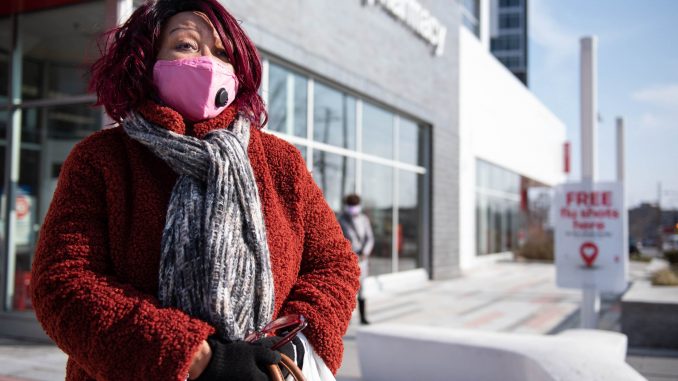
With schools online and access to the public places and events limited due to the COVID-19 pandemic, stay-at-home mom Mary Shorey, 36, is feeling cooped up.
She and her three children do art projects and play in their home’s backyard on Cecil B. Moore Avenue near 16th Street, but Shorey knows the activity isn’t a replacement for socializing with others, she said.
“I just think kids need to get out, they need to get out and be with their peers,” Shorey added. “Then again, you don’t want them to get sick.”
This winter carried the burden of a year marked by isolation and worry as rising COVID-19 cases and public safety restrictions limit interactions between neighbors. Because of social restrictions and cold weather canceling outdoor gatherings that would be otherwise permitted, residents are feeling more cut off from their community and neighbors.
In past years, Temple University students and staff and North Central residents came together for service events, like the community dining program at the Berean Presbyterian Church on Broad and Diamond streets.
These events built rapport between both communities by engaging in shared interests, said Andrea Swan, director of community and neighborhood affairs.
But because of COVID-19 concerns, the dining program and other volunteer projects, like those hosted every year for Martin Luther King Jr. Day, are suspended to follow the Philadelphia Department of Public Health’s safety guidelines on limiting social gatherings to immediate household members.
“We’re all coping as best as we can, certainly we miss our in-person engagement and interaction with our neighbors,” Swan said.
Temple’s community outreach programs are canceled or moved to Zoom, and socializing among community members reduced significantly, making “the community just feel hopeless right now,” said Terry Starks, Republican leader of Ward 20, which encompasses most of Main Campus.
“The community is in deep depression,” he added. “We always teamed up with the college for different projects, COVID slowed all of that stuff down, so hopefully we can find another game plan to get the community back jump-started.”
Minister Faith Denson, 60, who lives on 8th Street near Oxford, feels an increase in anxiety among her neighbors because visiting other people presents danger of contracting COVID-19.
“I really miss that, the community events, coming together,” Denson said. “We really do miss all that because we have to remain isolated. I just hope we can get through this.”
Other Temple community outreach programs like the Pan-African Studies Community Education Program have moved to online platforms so residents can safely access programming, Swan said.
Last semester, a Thanksgiving community food drive, done in partnership with Campus Safety Services, was hosted outdoors where participants could meet physically distanced. But now, winter weather makes meeting outdoors less viable, so more events are happening online, Swan said.
“It is strange and I think it’s something that many of us are still trying to get used to, but we must take these steps, it’s better safe than sorry,” she added.
Community gardens around North Central pause their work each winter when cold weather conditions make gardening difficult, Starks said. But he looks forward to gardening coming back, as it’s an in-person community activity that remained available last year because its outdoor setting allows for social distancing.
Starks is seeing the absence of community programs, like Cradle to Grave, a gun violence prevention program at the Temple University Hospital Trauma and Surgical Critical Care center, worsening mental health in his neighborhood, he said.
The program shut down abruptly in March due to COVID-19. For 15 years, the initiative has worked with at-risk youth and adults in reentry programs to educate about how gun violence impacts communities, said Scott Charles, co-director of Cradle to Grave.
“One day I’m bringing kids in and talking about gun violence, the next day I’m wearing PPE and going into the ICU,” he added.
Charles isn’t sure the experience of being in the trauma center can be effectively translated onto an online platform because participants lose the emotional connection to the content.
“What makes Cradle to Grave unique is that up-close experience,” Charles said. “We’re also not giving up on this, we recognize that there’s a need to do something.”
Leon Taylor, a 34-year-old food delivery driver who lives on Uber Street near Montgomery Avenue, has seen kids in his neighborhood lose opportunities to engage with each other, as local recreation centers close and some after-school activities are suspended, he said.
He’s also seen his neighbors struggle with losing their jobs due to shutdowns from the COVID-19 pandemic, or are elderly and afraid to go outdoors, Taylor added.
“They struggling to maintain, to keep food in the house for they family,” he said. “I got a couple seniors on my block I try to make sure that they safe, run out and try to get them some food when I can.”
Taylor hopes that with a COVID-19 vaccine available, the community can find some normalcy soon.
Denson feels social distancing will give North Central the best chance of being able to come back together soon.
“There’s a lot of fear out here, but I just think you need to do what you know to do,” Denson said. “I just say go forward.”



Be the first to comment